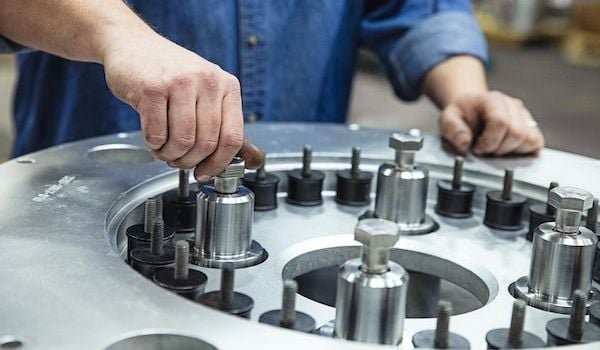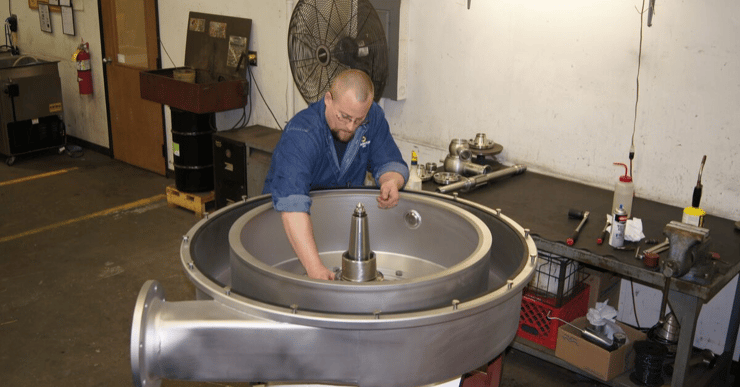Search Separators
5 Ways to Become Better at Servicing Your Centrifuge
Centrifuge care and maintenance isn't something that comes naturally to most. Instead, it’s a skill that takes time to develop. I've been working with centrifuge equipment for decades, and I’ve worked with countless individuals who needed training on the basics of centrifuge service and maintenance because if you don’t know, you don’t know. So if you’re new to centrifuge equipment or if you’re just looking for a refresher, I've prepared the following list of ways anyone can increase their proficiency with this equipment.
Pandemic Response from Separators: COVID-19
Editors note: This post was originally published on March 19, 2020 and has been updated to reflect the most accurate state of our operating details.
First, thank you. We value our clients, our team members, and the communities we serve, especially during these uncertain times.
Separators Way [Service Report]
Here at Separators we understand that great customer service doesn’t end when a technician leaves your facility. In a lot of ways, it’s only the beginning. As the largest independent centrifuge service technician organization in North America, we are committed to being thorough and accurate in all that we do. This includes giving our customers access to the information they need to keep their centrifuge equipment operational for years to come.
Digital Agriculture, Technological Innovation, and Separators
Technologies in Agriculture
If you’re in the agricultural field, there’s no doubt that you’ve begun seeing a change in the industry. All over the United States, there has been a large push for farmers to incorporate technology into their craft. Every day more farms adopt emerging technologies in order to maximize product yields. For those who may be skeptical, we assure you that digital agriculture is the way of the future. This rise in technology not only lends itself to heightened productivity but also to a more manageable life for the farmers that adopt them.
Separators Way [Service Visit]
Scheduling service for your equipment can be a daunting task. Whether or not you've suffered an equipment failure, fitting service into your schedule isn't always easy. This is a situation equipment operators know all too well. That’s why at our business, we’ve made scheduling routine and emergency maintenance as easy as can be.
When you service with us, you can expect results that are just as streamlined as your production process. We strive to get you back to being fully operational as soon as possible.
How A Remanufactured Centrifuge Allows You to Keep Your Current Baseplate
No doubt about it, replacing your current centrifuge with a new machine is a large undertaking. Not only does it involve the capital investment of new equipment, it also typically involves reconfiguring feed lines and replacing your baseplate. And in case you're not familiar, replacing a centrifuge baseplate is a big job all on its own. It involves breaking the existing one out, pouring fresh concrete, and waiting for the curing process. And that all comes after you've worked out the details on the business end. Luckily, there's a way to skip this entire process while getting the equipment upgrade you need.
Pre-Maintenance Process for Centrifuge Service: Final Preparations [Part 4 of 4]
At Separators our technicians perform centrifuge maintenance services on site at customer facilities. By performing minor centrifuge services out in the field, equipment only needs to shut down for a short period of time and be back up and running in a matter of hours. While performing on-site maintenance brings a lot of benefits to our customers, it also can seem confusing to prepare for.
That’s why we created the Pre-Maintenance Checklist.
Pre-Maintenance Process for Centrifuge Service: Machinery and Equipment [Part 3 of 4]
Wondering what it takes to prepare for an on-site visit with our service technicians? We’ve put together a checklist detailing each step in that process.
When a Separators Inc. service technician travels to perform centrifuge maintenance in your facilities, having the right machinery and equipment in place helps ensure the service goes off without a hitch. I’ll detail what you need to know about machinery and equipment below, but before I go any further, know that you can get your copy of the Pre-Maintenance Checklist here.
Pre-Maintenance Process for Centrifuge Service: Documentation [Part 2 of 4]
We’ve put together a checklist our customers can use to prepare for an on-site visit from our service technicians. Separators service technicians travel all across the United States to perform centrifuge maintenance in our customers’ facilities. Because we perform service on-site, we check on and verify a handful of items before the day of the service visit. Before I go any further, know that you can get your copy of the Pre-Maintenance Checklist here.
How To Prepare for Centrifuge Machine Maintenance
Minor and major centrifuge service visits are staples for keeping your production line running. Because these visits require our technician to complete all of the work at your facility, there are a few things you’ll need to prepare for prior to the day of your service.



![Separators Way [Service Report]](https://www.separatorsinc.com/hs-fs/hubfs/Service-Report-Blog-Image.png?width=740&name=Service-Report-Blog-Image.png)

![Separators Way [Service Visit]](https://www.separatorsinc.com/hs-fs/hubfs/SEP%20Service%20Visit%20Blog%20Cover%20Image.png?width=740&name=SEP%20Service%20Visit%20Blog%20Cover%20Image.png)

![Pre-Maintenance Process for Centrifuge Service: Final Preparations [Part 4 of 4]](https://www.separatorsinc.com/hs-fs/hubfs/separators-checklist-maintenance.jpg?width=740&name=separators-checklist-maintenance.jpg)
![Pre-Maintenance Process for Centrifuge Service: Machinery and Equipment [Part 3 of 4]](https://www.separatorsinc.com/hs-fs/hubfs/SEP%201-3.png?width=740&name=SEP%201-3.png)
![Pre-Maintenance Process for Centrifuge Service: Documentation [Part 2 of 4]](https://www.separatorsinc.com/hs-fs/hubfs/facility-documentation-with-hardhat.jpg?width=740&name=facility-documentation-with-hardhat.jpg)
